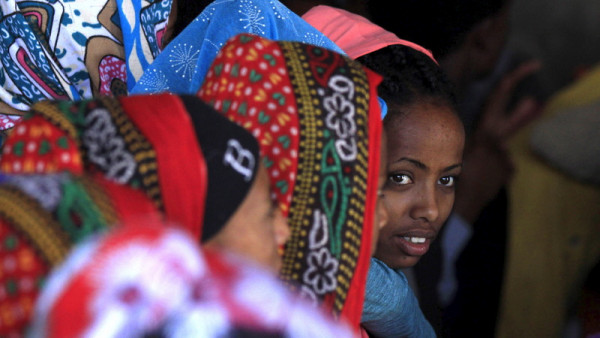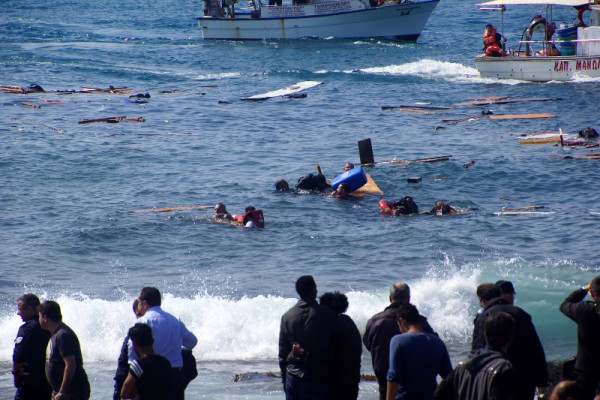 Mail and Guardian
Mail and Guardian
Meron Estefanos
Stockholm, 25th March 2018
Thousands of African refugees and migrants are trapped in Libya, where they are exposed to enslavement, torture and rape. A vast network of militias, armed groups and smugglers inhumanely brutalise these refugees held captive, demanding ransom for their release. This Old-World experience might be new for the international community, but it is sadly normal for the Eritrean people, who have become accustomed such horrors. With the abuse against Eritrean refugees persisting on for almost 10 years, in Sudan, Egypt, Yemen, Israel, and now Libya, Eritreans have become desensitised; the slavery in Libya is “the new normal”.

In Sudan, we get kidnapped and sold; in Egypt we get auctioned and sold; in Libya we are sold over and over again; Israel pays Rwanda $5 000 for our resettlements; and worst of all, our president demands $50 000 from Israel for our deportation and torture. This is what it means to be an Eritrean refugee in 2018! It is an enigma that I fail to resolve.
Narrating the tragic, first-hand accounts of Eritrean refugees held in the hands of smugglers and armed militias can provide a clear picture as to why these refugees are willing to take such risks. As an activist and journalist, I have been reporting on the plight of Eritrean refugees around the world. While it was encouraging and vindicating to witness the international community’s outrage against slavery in Libya, still, every month, more than two thousand young people join the hundreds of thousands in refugee camps in Sudan and Ethiopia. Despite a population of only five million, Eritrea is one of the largest refugee-producing countries in the world.
Of all the atrocities taking place in Eritrea, be it against dissident politicians, independent media professionals, religious leaders and community elders, it is the plight of the youth that is the most harrowing. Eritrean youth are wrought with most horrifying and tragic obstacles on their way to Europe. A young Eritrean who gives up hope and leaves his native country, choosing the prospect of a dignified death abroad over an undignified life in Eritrea, is either tortured, raped or dies a slow agonising death. By fleeing the indefinite military conscription and human right abuses in their own country, they are exposed to a vicious cycle of tragedy.
In my years of activism, I have heard stories that shocked my conscience and made me question humanity. But there are few stories that remain glued to me always, that I am unable to erase from my memory. Here are three of them.

The biggest one is a story that shocked the world in 2013. On 03 October, a tragedy struck in the Mediterranean Sea, very near the idyllic Italian cost of Lampedusa. A refugee-carrying boat capsized, and more than 350 Eritrean men, women and children vanished within sight of safety.
Yohanna, a 22-year-old was among those who lost her life. Had she survived the tragic death in Mediterranean, she would have given birth to a child and enjoyed being a parent together with her fiancé in Italy. But as fate would have it, her child was born as she was sinking to her death. Both were found amidst the wreckage, with the umbilical cord still connecting them in death as they were in life.
The lives of Helen and her four children were also claimed by the tragedy of that day. She was on her way to join her mother in Europe and give her children a better future. Those who survived the tragedy remember how she had gathered all of her children near her, trying to hold them in embrace to save them. She screamed in agony as one after another slipped out of her arms to their deaths. She wailed in anguish, she cried her regret, and finally, she, too, was swept away, or maybe she decided there was nothing worth holding on for.
I am also left thinking of this horrifying story of torture and rape at the hands of the human traffickers in the Sinai Desert. Mulugeta, a former Eritrean freedom fighter, decided to abscond the country with his two teenage daughters, hoping for a better future and education for his girls in Europe. Within days, they reached a Sudanese camp. Hours after their arrival, soldiers came into the camp, and traffickers followed. Mulugeta was beaten, his legs were sliced and cut and he, along with his two daughters and a group of other refugees were taken to Sinai by force. For 15 days, they crossed the desert, with little food and water. When they arrived at a new camp, Mulugeta was forced to the ground, his face in the dirt while iron chains were roughly locked around his ankles and wrists. He was beaten over and over again. He witnessed the man next to him die from malnourishment and the beatings.
Mulugeta was helpless to intervene as his daughters were stripped, sexually violated and beaten. The traffickers used stones, chains, or tree branches to beat victims on their legs, back and even head, he explained. The pain was excruciating, but after a while, he admitted, he didn’t even feel it as his body became numb and it all became a blur. The traffickers demanded $40 000 for each of them. Mulugeta’s community in Eritrea raised the funds and gave them to his wife to transfer to the traffickers. He was released after three months with four others, was forced to abandon his daughters and arrived in Tel Aviv in November, where they were left out on the street.
Still, thousands of Eritreans perish at the hands of human traffickers in Libya or crossing the Mediterranean Sea. This situation is exacerbated by Europe’s attempt to contain African refugees in Africa and its push policy of external border protection and deportation. The failure to come up with policies to address the refugee issue is another problem. Providing development funds for countries like Eritrea in the hope of reducing the refugee crisis hasn’t worked. The Eritrean government has no intention to change the unlimited national service that pushes the youth out of the country. Until Europe and the international community proactively responds, it is not only Eritreans who will suffer from human trafficking but also other Africans, who are fleeing their countries in search of freedom and better life in Europe.
The question remains, what are Eritreans doing to change their plight to get rid of the root cause?
The dream of a prosperous Eritrea that respect the rights and dignity of its people still resonates with the youth. The resilience of this dream is instilled within them and they won’t give up fighting for it. They organise themselves and fight back. First, they fight their own bewilderment and then the system that has caused it. They organise solidarity marches and protests. They are the ones who marched in support of the finding of the Commission of Inquiry on human rights in Eritrea. They organise rescue missions and lobbying missions and try to organise mass phone contacts with their counterparts in Eritrea to keep the dream alive. They have made hundreds of thousands of calls as part of the Freedom Friday Movement. One-to-one calls and automated mass calls are made in an effort to engage Eritreans inside the country and encouraging them to show their resistance by taking actions that build their solidarity and confidence.
This relationship among the locals and across activists in the diaspora has encouraged a small but sturdy team to form inside the country. Their enthusiasm and boldness inspires everyone, including observers in the international community. They smuggled video clips, posted protest posters, launched and distributed an underground new paper. Recently, team Arbi Harnet were among those who shared several video clips and photos about the unprecedented 31 October 2017, protest staged by students Diae Al Islamai on Asmara.
This was a vindication and affirmation of what I said in 2013 at the Oslo Freedom Forum and I will reiterate it at next week’s Oslo Freedom Forum in Johannesburg on 26 March. “It is extremely early days and these are tiny baby steps, but the momentum of resistance doesn’t follow the normal stages of development, the Arab Spring has demonstrated that. I am fully confident that with time Eritreans, too, will rise and challenge the most brutal dictatorship in Africa.
As President Obama rightly articulated, “the refugee crisis is a test of our common humanity. We must recognise that refugees are a symptom of larger failures – be it war, ethnic tensions, or persecution.” Democracies do not produce refugees. If we need a permanent solution to the refugee crises, we need to address the root cause: democratisation and the violation of human rights in Africa. This is a global crisis, which needs global solution. Let the European countries and other international organisations use their leverage to push for change in Africa. Let the African people stand up against their own dictatorial regimes. It is through our combined effort that change can be real in Africa. Thus, on the occasion of World Refugee Day on June 20, let us all renew our commitments to fight for democracy and human rights all over the world. It only then that of tragedy of the refugee will come to an end!
Meron Estefanos
meron.estefanos@gmail.com
@meronina
Meron Estefanos is an Eritrean journalist and human rights activist. She is a contributor to the leading Eritrean diaspora news site Asmarino, and a presenter for Radio Erena (Tigrinya for “Our Eritrea”). She is also the co-founder of the International Commission on Eritrean Refugees, an advocacy organisation for the rights of Eritrean refugees, victims of trafficking, and victims of torture. Estefanos identifies families around the world who have been blackmailed into paying ransoms for their kidnapped family members, and she was a key witness in the first blackmail trial in Europe. Estefanos has been threatened and harassed for her work, especially her coverage of the case of Dawit Isaak, a Swedish-Eritrean journalist imprisoned without charge for more than 10 years in Eritrea. Despite the backlash, she continues to campaign for democracy in her country, which has suffered under the dictatorship of Isaias Afwerki since 1993. Estefanos has co-authored two books, “Human Trafficking in the Sinai: Refugees between Life and Death,” and “Human Trafficking Cycle: Sinai and Beyond.
